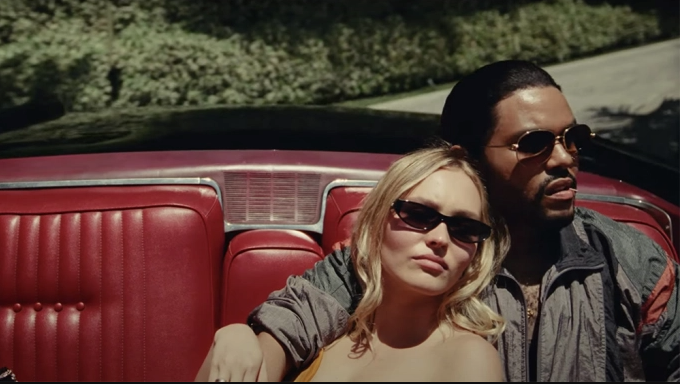When Euphoria creator Sam Levinson and Abel “The Weeknd” Tesfaye announced their new HBO series The Idol, they promised depravity. And to give them their credit, it has delivered. Each episode of the show so far has included at least one jaw-dropping, WTF-inducing piece of writing that tries so hard to shock and scandalize viewers, it becomes the only thing anyone remembers and thus gets in the way of whatever story these two edgelord creators are trying to tell.
Episode 3, “Daybreak,” is no different. Following on from last week’s truly unsexy sex scene, we see that Tedros’ (Tesfaye) grip on troubled singer Jocelyn (Lily-Rose Depp) is growing in strength—he has moved into her house and is exerting more and more influence on the decisions she makes about her career. And in the closing moments of “Daybreak,” he seems to cement his control over her in an act of abuse which he disguises as liberation.
During one of the most uncomfortable dinner scenes committed to film in recent years, Tedros cajoles and bullies Jocelyn into revealing the full details of the abuse she suffered at the hands of her mother. (Encouraging individuals to share their darkest secrets in a group setting is, of course, cult behavior 101.)
“She did a lot of things,” Jocelyn says. “Her favorite was probably hitting me with a hairbrush.” She then details how her mother would use these beatings as “motivation,” and Tedros suggests that Jocelyn “misses” the effect this had on her output since her mother’s death.
The only character at the table who seems to not be buying into Tedros’ pseudo-psychological posturing is Leia (Rachel Sennott). When Tedros tells Leia that she looks tired and should go to bed, he is removing the one person from the room who may have been inclined to speak out against what is about to happen.
“All that trauma, you’ve got to turn it into inspiration,” Tedros tells Jocelyn. “You’ve got to tap into it. You’re going to feel it. You’re going to face it. You’re going to remember it. You’re going to let it wash all over.”
He then has her fetch the hairbrush, which she still owns, and proceeds to reenact the beating, with everybody bar Leia watching. “This is really going to hurt,” he says. “But if you push through the pain, it’ll be beautiful.”
Jocelyn’s entire storyline up to this point has been a tragic portrait of a survivor who has not been given the time or care to heal from either the harm her mother inflicted on her, or the complicated feelings of grief to have arisen since her mother’s death, as everybody around her is so invested in the outcome of her new album. That they are so willing to go along with Tedros’ twisted ritual of catharsis makes the episode as depressing as it is uncomfortable to watch.
It’s in these kinds of moments that The Idol feels less like a provocative neo-noir and more of a horror movie, with viewers screaming at the screen for this young woman in peril to get the hell out of there while she still can. But then day breaks, and we see Tedros undressing and bathing Jocelyn. In the episode’s final seconds, she looks up at him and says: “Thank you for taking care of me.”
Jocelyn has, it seems, officially exchanged one abuser for another, perpetuating the cycle of violent control that defined her early life. The young woman has chosen to stay in the haunted house, and the horror movie continues.

Philip Ellis is a freelance writer and journalist from the United Kingdom covering pop culture, relationships and LGBTQ+ issues. His work has appeared in GQ, Teen Vogue, Man Repeller and MTV.



Comments are closed.